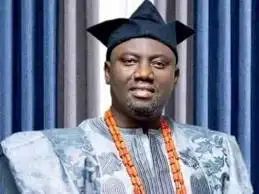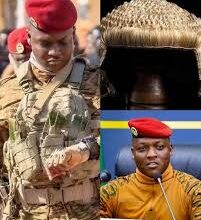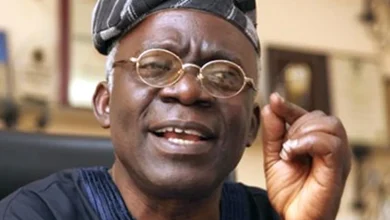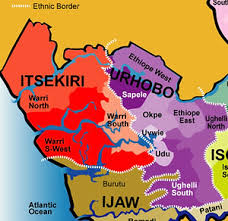Alaafin Owoade and Yoruba Renaissance

By Toyin Falola
It is an open secret that I was close to the late Alaafin Lamidi Adeyemi III. He was fond of reading my essays and books. He put them to use to validate some of his decisions. He sent some of his writings to me for comments. I discussed a project on the creation of an Oyo Museum with him. I was the keynote speaker when he turned 80, and I suggested Alaafinology as an academic discipline. There were moments when he had critical challenges about the governor to support for election or reelection. He was profoundly troubled about whether to support Jonathan Goodluck or Muhammadu Buhari, and he sought counsel from various people, including my humble self. He wanted to make me a chief, and I said we should wait till he was 90 years old. He attended four of my functions and presided over my 65th birthday ceremony.
This piece is not offered to continue any established relationship with Oyo and its palace but to play the role of an elder, providing advice to the new Alaafin, who has now used the throne of his ancestors to become my superior. I must prostrate to him, even though I am older. His appointment is now formalized by receiving the staff of office and a certificate from the Oyo State Governor on January 13, 2024. The announcement from the palace that he will embark on a 21-day preparation is heartwarming. He must do the rites as prescribed by tradition. The sacred nature of the institution must be preserved.
First, he must understand the context of history. The sacred nature of the institution must be respected. Yorùbá people are meticulous in their advancement and civilization. Every anthropologist and historian who is in the habit of studying the Yorùbá people would reveal to you how they built their civilization bricks by bricks. Exposed to the same socio-spiritual trajectory, they have created an enabling and safe environment for their identity with great pride in what and who they are. For millennia, Yorùbá people charted a course of history demonstrating their forebears’ valour. These long-term thinkers devised different means to cope with the prevailing predicament that nature throws at them. When external forces threatened expansionist aggression, Yorùbá people found ways to absorb their pressure to survive as an identity. Their determination to be an identity, especially in the face of mortal danger, lies in the understanding that when broken into smaller units, they become vulnerable, and that would potentially mean that they risk the prospect of eliminating their race on the surface of the earth. They have had to deal with internal problems to keep themselves afloat in the politics of life. After all, survival is the most instinctual response humans and animals give to every dangerous encounter.
Second, he must learn history. I can reveal to the new Alaafin that his immediate predecessor took time to understand history. Alaafin Adeyemi’s power of retentive memory was second to none. He had a memory arsenal covering almost 500 years. Alaafin Owoade must know history. This is not a difficult task. He could inherit what Alaafin Adeyemi created, a cluster of scholars under the leadership of Professor Akin Alao of Obafemi Awolowo University. The new Alaafin could call on Professors Tayo Adesina, Olukoya Ogen, Siyan Oyewesi, Olufunke Adeboye, and others to prepare him for history lessons. Both Oyeweso and Adesina were very close to your predecessor, Alaafin Adeyemi III, who had commissioned the duo to embark on the Oyo Oral History Project. In October 2018, the duo organized an International Conference titled “Alaafin in Yoruba History: Culture and Political Power Relations” in honour of Alaafin Adeyemi, where I served as the Keynote Speaker.
Advertisement
He must remember that what remains constant is that while charting such historical undertakings in their past, both Oyo and Ile-Ife have been very prominent in determining the direction of their growth. In other words, these two urban communities were central to their sustenance as a people. From time to time, they have adapted and given room for the rise of subgroups among them who would defend the Yorùbá civilization and identity. In their recent history, Ibadan rose as the garrison of the Yorùbá military power, saddled with the responsibility of repelling external threats to protect their common interest.
The new Alaafin must not engage in historical revisionism as his counterparts now do. Rewriting history is dangerous, as in saying the Benin Empire owes little to Ile-Ife and Oranmiyan. Conflating Ugbo with Igbo is a wrong-footed interpretation of the past. He needs not to dabble into issues of superiority around who the superior king was in the past. Oyo and Ile-Ife are constant in the people’s history because they represented the seats of economic and political power and the spiritual rallying point of the Yorùbá people. Let him explore the consensus around historical prestige: the foundation of prominent Yorùbá ancestors and the creation of a glorious history.
The late Alaafin was bold in the right ways. The boldness of taking initiatives and profound actions that brought Oyo to the preeminence that it enjoys in the history of the Yorùbá people puts it on a close cultural pedestal with other powerful kingdoms. The Oyo empire remains strong in the history of the black people. That accomplishment is associated with Oyo and the political dynasty, which saw the sub-nation’s centuries-long imperial power over its environment. To that extent, when preserving Yorùbá identity and integrity, it is assumed that both Ile-Ife and Oyo save their race. I am a chief of the Gaa in Ghana, and without Ile-Ife and Oyo, the Yoruba’s reach to modern-day Ghana would not have been possible. The new Alaafin must visit all West African countries in solidarity. Going to Abidjan and the Gambia must be mandatory. He must reenergize cultural diplomacy to rebuild Pan-Yorubana.
As he rebuilds Pan-Yorubana, one of the most critical assignments for every Alaafin is to galvanize his royal authority to reinvigorate the consciousness of the Yorùbá people, generally both at home and abroad. For illustration, being the second-in-command to the supernatural forces, tradition dictates that no first-class Yorùbá Oba should bow for anyone, not even their biological parents, for the action of genuflecting by people of such authority means submission, not only of themselves but also the collective Yorùbá irrespective of their sub-nations. Alaafin Owoade is not part of the Sokoto Caliphate. No one has given him a flag! Yes, he is a Muslim, but he must see himself first as a Yoruba before being a Muslim. He is not the king of Muslims but the king of the Yoruba people. He must not be associated with the expansion of the Sharia. He is an Alaafin, a cultural Yoruba leader, not an Amir al-Mu’minin, the Commander of the Faithful. The day he gets drawn into political Islam, that day his rule is over.
Like his predecessor, he must be associated with isese. It is no coincidence that the stool of Alaafin is associated with Sàngó―that ferocious king creating the foundation of electricity and thermodynamics. Sàngó was one of the founders of science, a deity and King who represented boldly and exuded confidence and whose authority was widespread. As a deity, Sàngó is known to be the custodian of fire energy and could consume things with rage within a self-contained grid. Alaafin Adeyemi continued with the adoption of Sàngó, reaching far into the diaspora to consolidate that knowledge. The new Alaafin can convert this into modern science and seek the means to create technological hubs. A science academy can tap into an indigenous knowledge system while using the most expansive modern knowledge to move Oyo forward.
The new Alaafin must understand the need for contemporary leadership that is ethical and people-oriented. The socio-cultural import of Yorùbá history is that anyone sitting on that stool would inherit such character of leadership because they are meant to repel danger away from the Yorùbá world. Nobody will do this when they cannot take leadership responsibilities and initiatives. In essence, the Alaafin can make other chiefs accountable for their people and the Yorùbá populace generally by making them take charge of what is expected.
Nobody can deny that the collective sweat of the Yorùbá people is a shared responsibility of the people irrespective of where they are from, but central in such reality is the Alaafin, who would always make himself available for his people. As such, he is expected to call them to order when he notices things are not moving. Nobody dares to undermine the authority of the Alaafin among the Yorùbá people. For that reason, the new Alaafin should immediately take the authority of his office to see to the installation of the proper virtues on the thrones of Yorùbá kings. The position of Oba is an exclusive toil of selfless and relentless figures who were deeply rooted in indigenous power, and it should not be usurped by people masking their desire to please their expansionist allies.
The moral authority of the new Alaafin must not be compromised by atenuje and ijekuje. We should not see him drinking beer in public and frolicking with women of cheap virtues. Oba Owoade must not debase his office by collecting money from visa applicants who want to follow him to visit foreign lands. If he wants to wear his gym suits, please do not go on major streets in London. We can arrange private spaces for you. Alaafin Adeyemi consumed moderately ogi and moinmoin in the morning and amala with one piece of meat in the afternoon. One cannot say because he is a king, he would consume more salt than the commoners. Royalty is not about the consumption of massive bowls of food daily. Enjoyment with friends can be confined to secret spaces. Today, some obas collect envelopes to attend events, including naming ceremonies. This is a “no-no”. Alaafin Adeyemi gave me money, including writing a substantial check when I turned 65. When Alaafin Owoade picks small checks from his subjects, the gossip spreads faster and undermines his authority.
In recent times, Yorùbá cultural values have expanded beyond the shores of its immediate boundaries, and it does require that a more coordinated strategy must be used to place Yorùbá future at a vantage position where it will become impregnable to be overcome.
Here is a to-do list:
The Alaafin must visit Cuba, Brazil, Haiti, Trinidad and Tobago and Grenada.
The new Alaafin is expected to put Oyo on the global map by unearthing, promoting, and sustaining the Yoruba race’s history, tradition, and culture as one of its chief custodians. Beyond its impressive artistic expression, Oyo’s breathtaking orature and rich Yoruba traditions cannot but promote the ubiquitous touristic potentials of Oyo and Yorubaland.
He must reignite the consciousness of the people towards embracing their historical values. Oba Adeyemi warmed himself into many people’s minds because he was fearless. He worked very hard to get his facts right, and when convinced of a matter, he dared to speak up his conviction. He was even-handed in dealing with people and situations, and the motto of his reign was justice and mercy. He believed that culture was the principal magistrate of a person’s life.
He must promote the Yoruba language. It is the best thing that the Alaafin can do to plant the consciousness of the Yorùbá race into the hearts of its descendants and admirers who now occupy different places of the world. Yorùbá language must be revived as a language of technology in ways that anyone using whatever is produced by the Yorùbá people would be smitten by the profundity of their culture. To achieve this, the Alaafin can harness the political and economic power that Elédùmarè has granted to the descents of Oduduwa and create foundations for the technologizing of Yorùbá history, industry and economy.
The Alaafin must connect very keenly with Ile-Ife to defeat the possibility of internal contradictions and strife that could trigger implosion based on seeking self-serving ambitions. It is important to note that the world continues to showcase its capacity for self-destruction, especially in ways that some are hellbent on ruining everything. To be safe in such conditions, people must devise ways to be safe collectively. The responsibility to attain this rests on the shoulders of Alaafin and other first-class kings in Yorùbáland, and they should not delay swinging into action.
He must promote culture. From music to songs, literature to any form of art generally, the descendants of Oduduwa have demonstrated that an inexhaustible content is archived in the annals of Yorùbá history. It thus requires a coordinated mechanism to help promote such engagement to increase the popularity of Yorùbá and make their people embrace the identity they have had reasons to conceal for a long time.
He must promote peace. Yorùbá people are easygoing, peaceful and tranquil. They are constantly seeking ways to allow them to make maximum impact without being subjected to malicious treatment or being taken advantage of by people who miscalculate their calmness for idiocy. However, recent developments have indicated that internal contradictions are imminent except if the people come together and understand what is at stake when they allow themselves to be used by external forces whose predominant ambition is to exploit and subject Yorùbá race to generational subservience.
He must have foresight. The Alaafin is responsible for using his foresight to solve problems that have yet to germinate. This is the turf of generations of Alaafin who lived thousands of years ago, and that tradition must be sustained in contemporary times. When they continue to promote Yorùbá interests, they will have a better chance of establishing a sound economic power base that will help the descendants of Oduduwa remain relevant for ages to come.
While he must respect all religious leaders, he must not go to Pentecostal churches to kneel for Pastors to place their hands on him. He could do so in private.
He must continue with the initiative to build a museum at Oyo. UNESCO has declared Ifa as a heritage site in Oyo. It is essential to complement this with a modern museum accessible to his people from far and near. Within a few weeks of the passing of Alaafin Adeyemi, the distinguished Professor Isaac Albert called me to say that we must collect all his extraordinary dresses and regalia to be part of a museum. But without urgent security control, loot seekers immediately plundered parts of the palace. This must never happen again.
Summon prominent leaders to a meeting and let them understand the roles they would have to play in protecting the interest and integrity of the Yorùbá people because when the home is peaceful and safe, its children would have the confidence to invest back there. If you do not undermine the political authority of political leaders, they are historically under your jurisdiction, and you should use the power vested in you by the immaterial forces to propel Yorùbá people to greatness by suggesting ways through which they can protect the Yorùbá people on the land that their forebears bequeathed onto them. You must anticipate the infiltration of Yorubaland by forces that do not mean well for Yoruba people and work with other traditional rulers and stakeholders to map out strategies to preempt and forestall such infiltration. A mechanism to erect a non-physical wall of defence against external aggression should be implemented in Yorubaland. You should take the lead in pushing this initiative forward. Yorùbáland must promise economic, spiritual, intellectual, ideological, political, and environmental safety for all indigenes of Oduduwa, irrespective of their sub-nations. They should not become second-class citizens in their land, fought for with the blood of their ancestors. It must become the most fertile land for everyone, irrespective of race, gender, and religion.
Adopt an intellectual committee system, in addition to the existing traditional chieftaincies, to further modernize the system. You can have Intellectual Advisory Committees on history, culture, politics, education, economies, etc.
As a matter of urgency, the Alaafin must constitute the Oyo Development Committee along the lines of the Ondo Development Committee (ODC), a vibrant organization. An experienced biographer of ODC who can be contacted is the renowned administrator and distinguished scholar, Professor Femi Mimiko, who once sent a note to me, saying, “In the Ondo Development Committee (ODC), we stay on course. We aim to support the King and the Kingdom in developing our community. Development, since the last Ekimogun Day, has been good. Some of our people have come out to work on the projects they sponsored while we in the ODC have continued working on our infrastructure and other social projects. With these, our streets are better lit, some of our schools are being rebuilt, and the projects we embark on, like the Igba electronic market, continue to grow. … We have always realized that the Government cannot do it alone and thank God that we have great people with pronounced friends that are supporting our daunting visions by taking up some of the responsibilities of our development.”
The Alaafin can create an Oyo Microfinance Bank on strict professionalism to recapitalize low-income people. While the late Alaafin was generous in granting scholarships to people, this should be formalized into a modern banking system where people can take loans and repay. The Asanteman Council negotiated a World Bank loan to empower thousands of farmers. A professional team not interested in corruption can do the same for Oyo.
In relation to the preceding, royal institutions must now centre on development. In the past, Yoruba Obas did not rule their domains as mere mortals. The sacredness, rituals and myths associated with the Yoruba monarchical system are among the few reasons why Yoruba traditional systems and values garnered so much respect and admiration. However, against the backdrop that the awe, reverence, rituals and mysteries associated with the Yoruba royalty have dissipated over the years, contemporary Yoruba monarchical institutions will now be judged on the practical benefits they can bring to their subjects. It is this charitable purpose, more than anything else, that promises to restore and sustain royal popularity and respectability. The new Alaafin will have to look inward and see how Oyo and, by extension, Yorubaland can further be developed socio-economically, culturally and sustainably.
The new Alaafin’s reign must usher in an Oyo monarchy that has moved far away from royal jamborees and the prosecution of supremacy battles to being an institution of value that is contributing significantly to the realisation of Goal number 11.4 of the United Nations Sustainable Development Goals which has to do with the promotion of indigenous culture. Indeed, culture is at the heart of the SDGs. Culture is who we are and what shapes our identity. Placing culture at the heart of development policies is the only way to ensure human-centred, inclusive and equitable development.
Security. Alaafin Adeyemi III paid attention to this, and I can confirm that he spent much of his money securing many places under his authority.
To the newly emerged Alaafin Abimbola Akeem Owoade, I reawaken your consciousness by revealing that your role in keeping the Yorùbá people in national and global politics is sacrosanct. Because Elédùmarè chose you, hundreds of Irúnmolè and your forebears are behind you. I cannot doubt the innate possibilities you have to consolidate the rise of Oyo and the Yorùbá people worldwide in a global age. There are too many contending forces and issues. I supported your predecessor to the best of my ability and promise to help you to the extent you desire.
Ọmọ Owoade o kú ewu
Ewu iná kan kìí pàwòdì
Aláàfin ikú bàbá yèyé
Káde kó pẹ́ lórí
Kí bàtà ò pẹ́ lẹ́ṣẹ́
Kí ìrùkẹ̀rẹ̀ ó jẹ́ kó dokinni
Láyé olúgbọ́n ayé rójú
Láyé Arẹsà ayé kúkú tòrò
Láyé Aláàfin Abimbola
Kí ìgbà kò tu tonílé-tàlejò
Kí ara kó dẹ tọmọdẹ́-tàgbà
Àwọn alálẹ̀ a sì tì ọ́ lẹ́yìn
Ǹlẹ́ ọmọ òjò pa ṣẹ̀kẹ̀rẹ̀ mọdẹ àtìbà
Ọmọ ikú tíkú ò gbọ̀dọ̀ pa
Ó di dandan kó o dádé yìí pẹ́
O kú oríire
Àwọ́n aláṣeku a sì bá ọ ṣe e
Títirí méje làá kọ́mọ Aláàfin
Ilá tiri ilá kó
Ikàn tiri wẹ̀wù ẹ̀jẹ̀
Ìkóǹkó tiri mọ́yán
Àwọ̀n tiri pẹja
Ọmọ Owoade
Mo bá ọ yọ̀
O kú oríire.





